Daily Vocabulary Words: List of Daily Used Words in Leading International Newspapers
Hi there. Welcome to this special section @ Wordpandit.
Our endeavour here is very simple: to highlight important daily vocabulary words, which you would come across in leading newspapers in the country. We have included the following newspapers in our selection:
• The New York Times
• The Washington Post
• Scientific American
• BBC
• The Guardian
• Psychology Today
• Wall Street Journal
• The Economist
We are putting in extensive work for developing your vocabulary. All you have got to do is be regular with this section and check out this post on a daily basis. This is your repository of words that are commonly used and essentially, we are posting a list of daily used words. Hence, this has significant practical application as it teaches you words that are used commonly in leading publications mentioned above.
Visit the website daily to learn words from leading international newspapers.
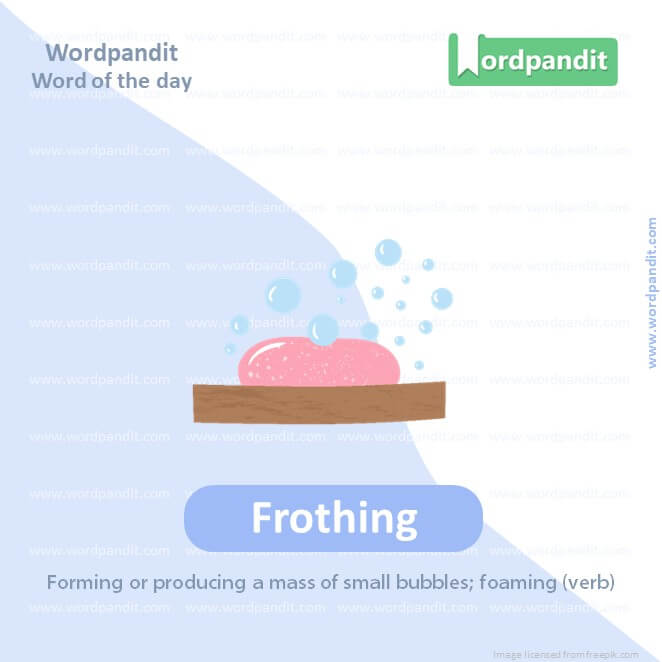
WORD-1: Frothing
CONTEXT: A date that secured its place in history back when members of MAGA Facebook groups rushed the seat of US democracy in a frothing rage at everything and nothing.
SOURCE: The Guardian
EXPLANATORY PARAGRAPH: Imagine if you poured soda into a glass and saw bubbles forming at the top with a lot of fizz. That’s what “frothing” means—it’s when a liquid gets filled with bubbles and looks foamy or bubbly.
MEANING: Forming or producing a mass of small bubbles; foaming (verb).
PRONUNCIATION: FROTH-ing
SYNONYMS: foamy, bubbly, effervescent, fizzy, frothy
USAGE EXAMPLES:
1. The milk was frothing as it was being steamed for the cappuccino.
2. The waves were frothing at the shore, creating a beautiful scene.
3. The soap created a frothing lather when mixed with water.
4. The frothing champagne added a festive touch to the celebration.
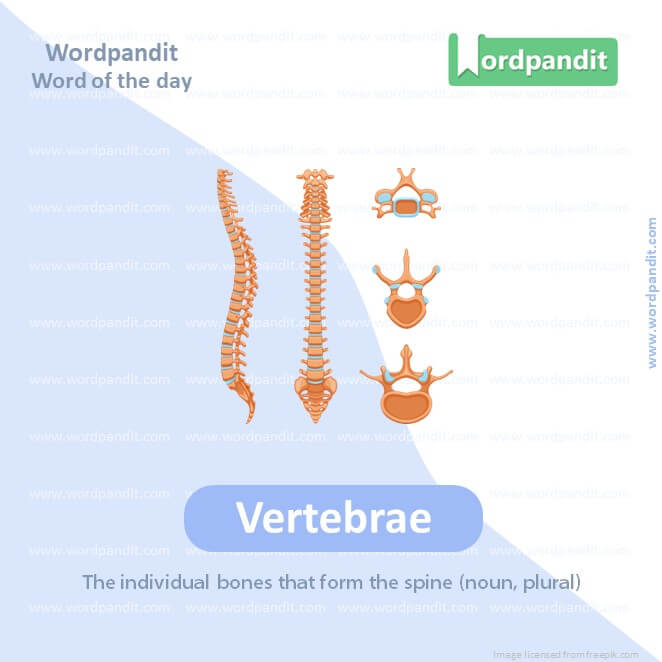
WORD-2: Vertebrae
CONTEXT: We arrive in the town, famous for its Bonfire Night, and visit its 15th-century bookshop, which has a ceiling so low I feel at least two vertebrae compress in real time.
SOURCE: The Guardian
EXPLANATORY PARAGRAPH: Imagine if you looked at the bones in your spine, each one like a small block stacked on top of each other. Those blocks are called “vertebrae,” and they make up your backbone or spine.
MEANING: The individual bones that form the spine (noun, plural).
PRONUNCIATION: ver-tuh-brey
SYNONYMS: spinal bones, backbone, spine
USAGE EXAMPLES:
1. The doctor pointed to the vertebrae in the X-ray to explain the injury.
2. The vertebrae provide support and protection to the spinal cord.
3. Injuries to the vertebrae can affect mobility and sensation.
4. The vertebral column is made up of individual vertebrae.
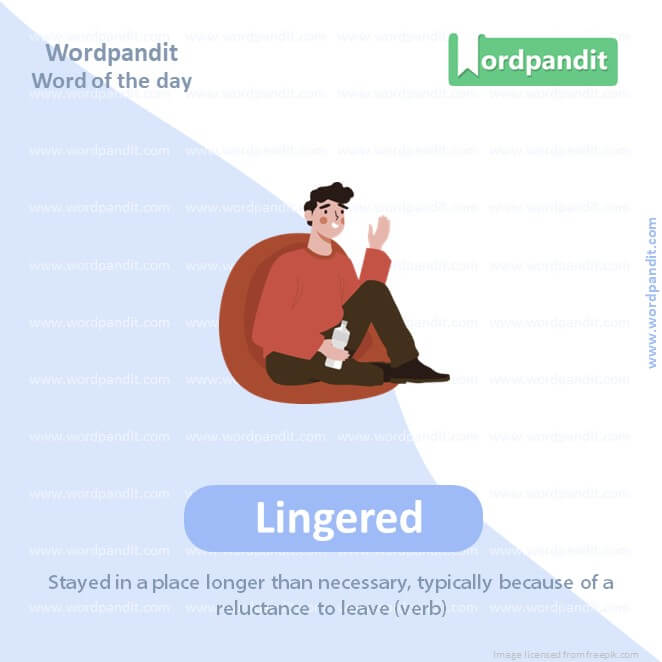
WORD-3: Lingered
CONTEXT: Somewhat controversial and complicated, the proposal has long lingered in policy limbo despite bipartisan congressional backing.
SOURCE: The Washington Post
EXPLANATORY PARAGRAPH: Imagine if you stayed at the park even after the sun went down because you were enjoying yourself so much. That’s what “lingered” means—it’s when you stay in a place longer than expected because you’re reluctant to leave.
MEANING: Stayed in a place longer than necessary, typically because of a
reluctance to leave (verb).
PRONUNCIATION: LING-gerd
SYNONYMS: stayed, remained, loitered, tarried, hung around
USAGE EXAMPLES:
1. The aroma of freshly baked cookies lingered in the kitchen.
2. The memories of the trip lingered in her mind long after it ended.
3. The guests lingered at the party, enjoying the music and conversations.
4. The scent of flowers lingered in the air, creating a pleasant atmosphere.
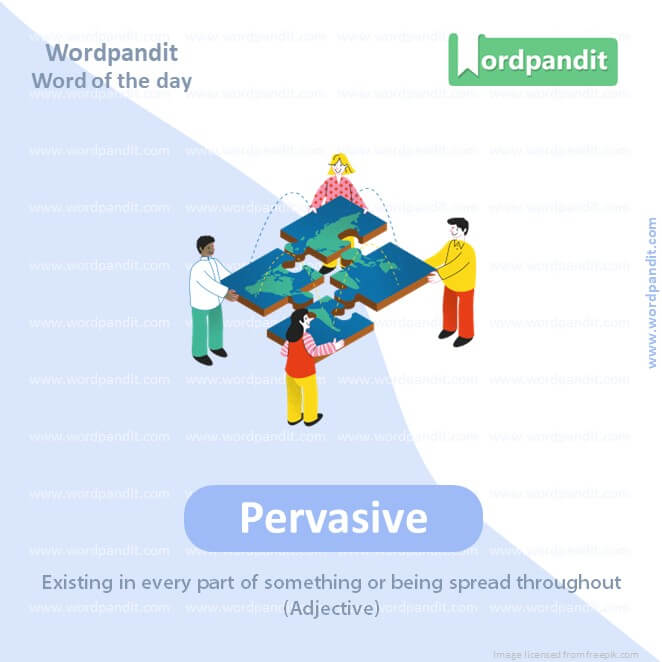
WORD-4: Pervasive
CONTEXT: This ran counter to the narrative she often heard, which was that vaccine misinformation can be so pervasive in a community that the nursing homes simply cannot solve it.
SOURCE: The Washington Post
EXPLANATORY PARAGRAPH: Imagine if you could smell the fragrance of flowers everywhere you went, not just in one place. That’s what “pervasive” means—it’s when something is spread throughout and can be noticed everywhere.
MEANING: Existing in every part of something or being spread throughout
(Adjective).
PRONUNCIATION: per-VAY-siv
SYNONYMS: widespread, prevalent, ubiquitous, all-encompassing, all-pervading
USAGE EXAMPLES:
1. The pervasive smell of smoke filled the room after the fire.
2. The pervasive influence of technology can be seen in daily life.
3. His pervasive optimism uplifted the entire team.
4. The pervasive use of social media has changed communication patterns.
WORD-5: Strangeness
CONTEXT: Or haven’t since the globe left us dizzy in its new strangeness and coughing became a borderline criminal offense.
SOURCE: The Guardian
EXPLANATORY PARAGRAPH: Imagine if you met someone who acted very differently from what you were used to, making you feel curious or confused. That’s what “strangeness” means—it’s when something is unfamiliar or unusual, causing a sense of curiosity or confusion.
MEANING: The quality of being unfamiliar, unusual, or strange (noun).
PRONUNCIATION: STRAYNJ-nis
SYNONYMS: unfamiliarity, oddity, peculiarity, novelty, anomaly
USAGE EXAMPLES:
1. The strangeness of the situation made her hesitate.
2. The play explored themes of alienation and strangeness.
3. His behavior had an air of strangeness that intrigued everyone.
4. She couldn’t shake off the feeling of strangeness in the new environment.
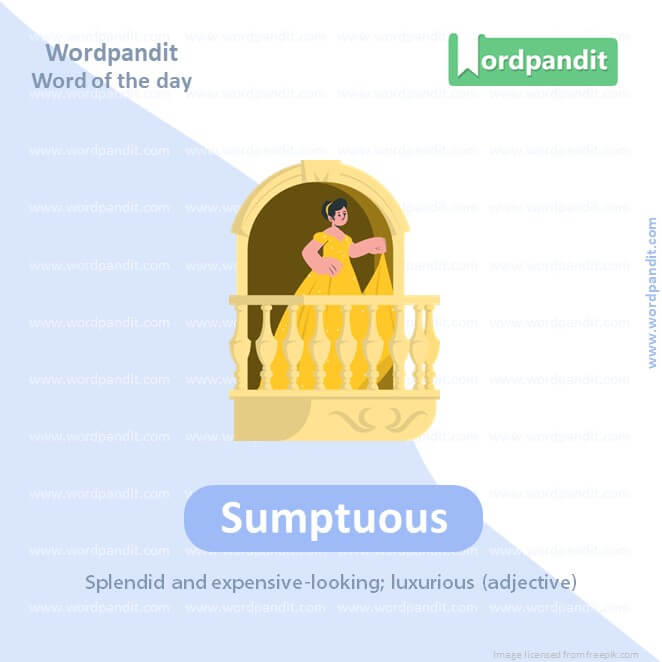
WORD-6: Sumptuous
CONTEXT: On our birthdays we give arrays of gifts, from the silly to the sumptuous.
SOURCE: Guardian
EXPLANATORY PARAGRAPH: Imagine if you were invited to a grand feast with beautifully decorated tables, filled with delicious food. That’s what “sumptuous” means—it’s when something is luxurious, splendid, and rich, especially in terms of appearance or taste.
MEANING: Splendid and expensive-looking; luxurious (adjective).
PRONUNCIATION: SUHM(p)-choo-uhs
SYNONYMS: luxurious, opulent, lavish, grand, magnificent
USAGE EXAMPLES:
1. The banquet was a sumptuous affair with gourmet dishes and elegant decor.
2. She wore a sumptuous gown to the gala event.
3. The hotel offered sumptuous accommodations for its guests.
4. The painting depicted a sumptuous feast fit for royalty.
WORD-7: Unrepentant
CONTEXT: I feed her the banana skins. In the farm gift shop, a woman almost trips over the lead of her excitable dog: “Margot, please,” she says, swivelling to look at an unrepentant yorkie.
SOURCE: Guardian
EXPLANATORY PARAGRAPH: Imagine if you did something wrong, and instead of feeling sorry, you didn’t regret it at all. That’s what “unrepentant” means—it’s when someone shows no remorse or regret for their actions, even if they were harmful or wrong.
MEANING: Showing no regret or remorse for one’s actions, especially when they are harmful or wrong (adjective).
PRONUNCIATION: un-ri-PEN-tuhnt
SYNONYMS: remorseless, unapologetic, defiant, impenitent, unabashed
USAGE EXAMPLES:
1. Despite the consequences, he remained unrepentant for his behavior.
2. The thief was unrepentant even after being caught red-handed.
3. Her unrepentant attitude caused friction in the workplace.
4. The criminal’s unrepentant demeanor angered the judge.
WORD-8: Swivelling
CONTEXT: I feed her the banana skins. In the farm gift shop, a woman almost trips over the lead of her excitable dog: “Margot, please,” she says, swivelling to look at an unrepentant yorkie.
SOURCE: Guardian
EXPLANATORY PARAGRAPH: Imagine if your chair could turn around in circles without you getting up. That’s what “swivelling” means—it’s when something can rotate or turn around a central point, often smoothly.
MEANING: Turning or rotating around a central point, especially smoothly (adjective, derived from “swivel”).
PRONUNCIATION: SWIV-uh-ling
SYNONYMS: rotating, turning, pivoting, revolving, spinning
USAGE EXAMPLES:
1. The swivelling chair allowed him to easily move between desks.
2. The swivelling spotlight illuminated different areas of the stage.
3. She adjusted the swivelling camera to capture different angles.
4. The swivelling mechanism on the door made it easy to open in any direction.
WORD-9: Excitable
CONTEXT: I feed her the banana skins. In the farm gift shop, a woman almost trips over the lead of her excitable dog.
SOURCE: Guardian
EXPLANATORY PARAGRAPH: Imagine if you had a friend who got very enthusiastic and energetic about everything, even small things like finding a shiny rock. That’s what “excitable” means—it’s when someone easily gets excited or worked up about things.
MEANING: Easily excited, enthusiastic, or prone to excitement (adjective).
PRONUNCIATION: ik-SAHY-tuh-buhl
SYNONYMS: enthusiastic, hyper, high-strung, lively, animated
USAGE EXAMPLES:
1. The excitable puppy jumped with joy whenever someone came home.
2. Her excitable nature made her a fun companion at parties.
3. The excitable crowd cheered loudly at the concert.
4. He was known for his excitable reactions to surprises.
WORD-10: Consonants
CONTEXT: Even with the introduction of more pills with multiple end-of-the-alphabet consonants, I could not stop.
SOURCE: Guardian
EXPLANATORY PARAGRAPH: Imagine if you sang a song and paid attention to the sounds made by the letters that weren’t vowels. Those letters, like “b,” “c,” “d,” and so on, are called “consonants.” They are the building blocks of words that create specific sounds.
MEANING: Speech sounds produced by obstructing airflow using tongue, teeth, or lips, excluding vowels (noun, plural of “consonant”).
PRONUNCIATION: KON-suh-nuhnts
SYNONYMS: none (as it refers to a linguistic concept)
USAGE EXAMPLES:
1. Learning the pronunciation of consonants is essential for clear speech.
2. The alphabet includes both vowels and consonants.
3. Children often start by learning consonant sounds before mastering words.
4. Linguists study the patterns and variations of consonants in different languages.
Vocabulary Daily
Language learning is a beautiful yet complex dance, where ‘vocabulary daily’ connote the integral beats. These everyday words form the essence of most of our conversations and are the cornerstone of effective communication. However, a methodical approach is required to efficiently learn ‘vocabulary daily’.
One key approach to learning ‘vocabulary daily’ is consistency. Engaging with a few words every day consistently fosters better understanding and recall than sporadic cramming sessions.
Interactive tools can add a touch of excitement and ease to mastering ‘vocabulary daily’. Flashcards, word of the day calendars, language learning apps can make the learning experience fun and fruitful. These tools not only introduce new words but often provide a context of use, aiding your understanding.
Making ‘vocabulary daily’ a part of your daily life is a surefire success strategy. Incorporating these words into day-to-day conversations, writing, or social media interactions greatly enhances retention and usage. It also allows you to witness firsthand the impact of a rich vocabulary on the clarity of expression.
To effectively grasp ‘vocabulary daily’, always keep a learner’s curiosity. Explore books, news articles, music, and podcasts in the respective language. This exposure helps in absorbing the words in a real-world context, thus building a robust bond with ‘vocabulary daily’.
In conclusion, understanding ‘vocabulary daily’ is an ongoing process that necessitates consistency, interactive learning, practical application, and a learner’s curiosity. By following this comprehensive approach, the task of mastering ‘vocabulary daily’ becomes less of a chore and more of an enriching journey that can lead to eloquent and effective communication. So, step into the exciting world of ‘vocabulary daily’ and let it colour your language learning adventure with shades of clarity, confidence, and joy.










